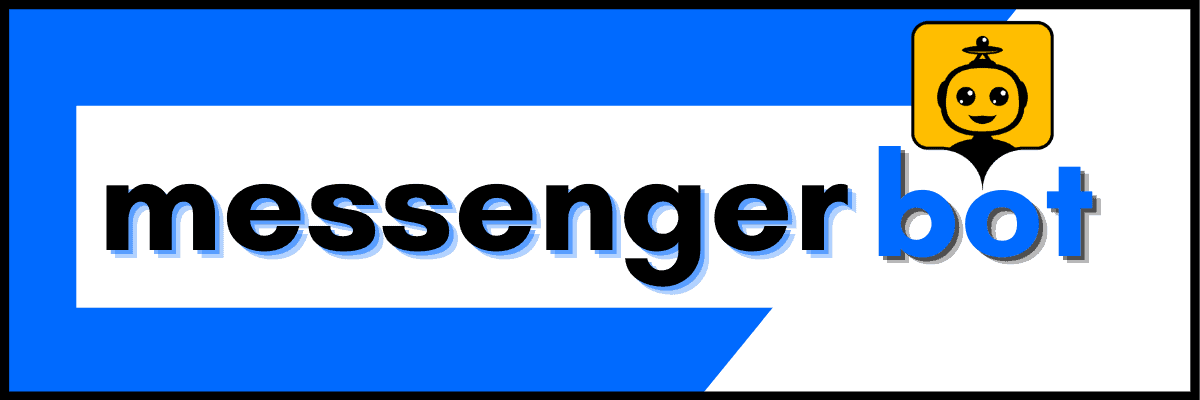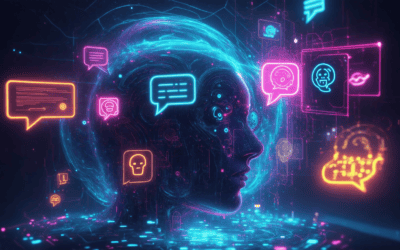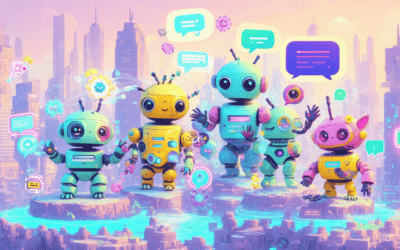In today’s fast-paced digital landscape, understanding how chatbot fuel can transform your business operations is essential. This article delves into the powerful capabilities of Chatfuel, the role of Google AI chatbots, and the strategic implementation of messenger funnels to enhance customer engagement and drive growth. We will explore critical questions such as, Is Chatfuel legit? and Is chatbot safe or not?, while also examining the key features that make Chatfuel a leading choice for effective chatbot development. Additionally, we will compare Chatfuel with other platforms like Manychat and Botpress, and discuss the impact of AI in chatbots, including the innovative Bard AI chatbot. By the end of this article, you will gain valuable insights into optimizing your chatbot funnels for better conversion rates, ensuring your business stays ahead in the competitive market.
How Chatbot Fuel Powers Your Business
Is Chatfuel legit?
Yes, Chatfuel is a legitimate platform for creating chatbots, widely recognized for its user-friendly interface and robust features. Here are some key points regarding its legitimacy and security:
- Data Security: Chatfuel employs advanced encryption protocols to ensure the safety and confidentiality of user data. According to their privacy policy, they adhere to industry standards for data protection, making it a secure choice for businesses.
- User Trust: Chatfuel has garnered positive reviews from numerous users and industry experts. It is utilized by over 300,000 businesses, including notable brands like Adidas and TechCrunch, which speaks to its reliability and effectiveness in chatbot creation.
- Compliance: The platform complies with GDPR regulations, ensuring that it handles personal data responsibly and transparently. This compliance is crucial for businesses operating in or with clients from the European Union.
- Support and Resources: Chatfuel offers extensive support resources, including tutorials, a knowledge base, and customer service, which enhances user experience and trust in the platform.
- Community and Feedback: The active community around Chatfuel provides a wealth of shared experiences and insights, further validating its legitimacy. Users frequently share success stories and best practices, contributing to a collaborative environment.
For more detailed information, you can refer to the official Chatfuel website and user reviews on platforms like G2 and Trustpilot, which provide insights into user experiences and satisfaction levels.
Understanding the Role of Chatbot Fuel in Business Growth
Chatbot Fuel, particularly through platforms like Chatfuel, plays a pivotal role in driving business growth by enhancing customer engagement and streamlining communication. Here are some ways it contributes to business success:
- Automated Customer Support: By utilizing AI-driven chatbots, businesses can provide 24/7 customer support, ensuring that inquiries are addressed promptly, which significantly improves customer satisfaction.
- Lead Generation: Chatbots can effectively capture leads through interactive conversations, guiding users through the sales funnel and increasing conversion rates. This is particularly effective in chat funnels where personalized interactions can lead to higher engagement.
- Cost Efficiency: Implementing chatbot solutions reduces the need for extensive customer service teams, allowing businesses to allocate resources more effectively while maintaining high service levels.
- Data Collection and Insights: Chatbots can gather valuable data on customer preferences and behaviors, enabling businesses to tailor their marketing strategies and improve overall service delivery.
- Multilingual Support: With the ability to communicate in multiple languages, chatbots can cater to a global audience, breaking down language barriers and enhancing user experience.
By integrating chatbot technology into their operations, businesses can not only enhance their customer service but also drive growth through improved engagement and efficiency. For more insights on how AI chatbots are revolutionizing customer service, check out this article.

Exploring Chatfuel
Is Chatfuel Free?
Chatfuel is a popular chatbot development platform that enables users to create AI-driven chatbots for Facebook Messenger and other messaging services without the need for coding skills. Regarding its pricing structure, Chatfuel offers a free plan that allows users to build and deploy chatbots with basic functionalities. This plan is ideal for small businesses or individuals looking to test the platform’s capabilities. However, it comes with limitations, such as a cap on the number of messages and features available.
In addition to the free plan, Chatfuel provides a 7-day free trial for its Pro plan, which grants access to advanced features, including unlimited messages, integrations with third-party services, and enhanced analytics. This trial allows users to fully explore the platform’s capabilities before committing to a paid subscription. For more detailed information on Chatfuel’s pricing and features, you can visit their official website: Chatfuel Pricing. Additionally, a comprehensive overview of chatbot functionalities can be found in industry resources such as the report by Grand View Research, which highlights the growing importance of chatbots in customer engagement.
Key Features of Chatfuel for Effective Chatbot Development
Chatfuel offers a range of features designed to enhance chatbot development and improve user engagement. Some of the key functionalities include:
- Visual Bot Builder: Chatfuel’s intuitive drag-and-drop interface allows users to create chatbots easily, making it accessible even for those without technical expertise.
- AI-Powered Responses: The platform utilizes AI to provide intelligent responses, ensuring that users receive relevant information quickly and efficiently.
- Integration Capabilities: Chatfuel supports integration with various third-party services, enabling businesses to connect their chatbots with tools like Google Sheets, Zapier, and more.
- Analytics and Insights: Users can track chatbot performance through detailed analytics, helping them understand user interactions and optimize their strategies accordingly.
- Multilingual Support: Chatfuel allows businesses to create chatbots that can communicate in multiple languages, broadening their reach to a global audience.
These features position Chatfuel as a competitive option in the chatbot market, alongside other platforms like Manychat and Botpress, each offering unique functionalities tailored to different business needs.
What is a Chatfuel Chatbot?
A Chatfuel chatbot is a sophisticated automation tool designed to enhance customer interactions primarily through platforms like Facebook Messenger. This cloud-based platform empowers businesses to create AI-driven chatbots that automate responses to customer inquiries, streamline communication, and improve overall engagement. With its user-friendly interface, Chatfuel allows users to build customized chatbots without requiring extensive programming knowledge, making it accessible for businesses of all sizes.
What is a Chatfuel chatbot?
Chatfuel is a powerful cloud-based chatbot development platform designed to enhance marketing operations primarily on Facebook Messenger. It enables businesses of all sizes—from small startups to large enterprises—to leverage artificial intelligence (AI) to automate customer interactions effectively. Key features of Chatfuel include:
- Automated Responses: Chatfuel allows users to create AI-driven chatbots that can provide instant automated responses to frequently asked questions (FAQs), significantly improving customer engagement and satisfaction.
- User-Friendly Interface: The platform offers a drag-and-drop interface, making it accessible for users without extensive programming knowledge to build and customize their chatbots.
- Integration Capabilities: Chatfuel seamlessly integrates with various third-party applications and services, including CRM systems, payment processors, and analytics tools, enhancing its functionality and allowing for a more comprehensive marketing strategy.
- Analytics and Insights: Users can track chatbot performance through detailed analytics, enabling them to optimize interactions and improve conversion rates based on user behavior and engagement metrics.
- Redirecting to Human Agents: For more complex inquiries, Chatfuel can redirect conversations to human sales representatives, ensuring that customers receive the assistance they need without frustration.
- Rich Media Support: The platform supports rich media formats, allowing businesses to send images, videos, and carousels, which can enhance user experience and engagement.
According to a report by Business Insider, the chatbot market is expected to reach $1.34 billion by 2024, highlighting the growing importance of AI-driven customer service solutions like Chatfuel in modern business strategies (Business Insider, 2021). For more information on Chatfuel, including pricing and user reviews, visit their official website or consult industry reviews on platforms like G2 and Capterra.
Comparing Chatfuel with Other Chatbot Platforms: Manychat, Botpress, and Tars Chatbot
When evaluating chatbot platforms, it’s essential to consider how Chatfuel stacks up against competitors like Manychat, Botpress, and Tars Chatbot. Each platform offers unique features tailored to different business needs:
- Manychat: Known for its ease of use and strong focus on marketing automation, Manychat allows users to create engaging chat funnels that drive conversions through Facebook Messenger and SMS.
- Botpress: This open-source platform is designed for developers, offering extensive customization options and flexibility for building complex chatbots that can be deployed across various channels.
- Tars Chatbot: Tars specializes in creating conversational landing pages, making it an excellent choice for businesses looking to enhance lead generation through interactive chat experiences.
While each platform has its strengths, Chatfuel’s combination of user-friendliness, robust analytics, and integration capabilities makes it a compelling choice for businesses aiming to enhance customer engagement through AI-driven chatbots. For more insights on chatbot solutions, you can explore this resource.
The Power of AI in Chatbots
Artificial Intelligence (AI) has revolutionized the chatbot landscape, enabling businesses to enhance customer interactions and streamline operations. With the integration of AI technologies, chatbots can now provide personalized experiences, automate responses, and analyze customer data to improve service delivery. This section explores the most powerful chatbots available today and the significant impact of Google AI chatbots on customer engagement.
What is the most powerful chatbot in the world?
As of 2024, the most powerful chatbot is widely recognized as OpenAI’s ChatGPT, particularly its latest iteration, GPT-4. This advanced AI model excels in natural language processing, allowing it to engage in human-like conversations and provide comprehensive answers across various domains, including coding, mathematics, writing, and research. ChatGPT’s capabilities include:
- Understanding Context: ChatGPT can grasp the nuances of conversation, making it suitable for complex queries.
- Versatility: It serves various applications, from customer service automation to educational tools.
Other notable contenders include:
- Claude (Anthropic): Launched in February 2023, Claude focuses on safety and ethical AI use while handling a wide range of tasks.
- Copilot (GitHub): Tailored for developers, it provides real-time code suggestions and integrates seamlessly with popular code editors.
- Bard (Google): Leveraging Google’s extensive search capabilities, Bard offers up-to-date information and insights.
- Jasper: Specializing in content creation, Jasper helps users generate engaging copy and streamline workflows.
For more insights on AI chatbots and their capabilities, you can explore OpenAI’s official documentation and analyses from reputable tech publications like ZDNet and TechCrunch.
The Impact of Google AI Chatbots on Customer Engagement
Google’s AI chatbots, including Bard and the Google Chat AI, have significantly transformed how businesses engage with customers. These chatbots utilize advanced algorithms to understand user intent and provide relevant responses, enhancing the overall customer experience. Key impacts include:
- Improved Response Times: Google AI chatbots can handle multiple inquiries simultaneously, reducing wait times for customers.
- Personalized Interactions: By analyzing user data, these chatbots can tailor responses to individual preferences, fostering a more engaging experience.
- Integration with Google Services: Google chatbots can seamlessly integrate with other Google services, enhancing functionality and user convenience.
As businesses increasingly adopt these technologies, the role of AI in customer engagement will continue to grow, making it essential for companies to leverage tools like Messenger Bot to stay competitive in the digital landscape.

Safety and Security in Chatbots
As we delve into the realm of chatbot fuel, understanding the safety and security aspects of chatbots is paramount. While these AI-driven tools enhance customer engagement and streamline operations, they also come with inherent risks that users and businesses must navigate. In this section, we will explore whether chatbots are safe and outline best practices for ensuring their security.
Is Chatbot Safe or Not?
AI chatbots can pose safety risks, primarily due to data storage and privacy concerns. Here are key points to consider regarding their safety:
- Data Storage Vulnerabilities: AI chatbots typically store user data on centralized servers. These servers can be susceptible to hacking attempts, where cybercriminals may infiltrate systems to access sensitive information. According to a report by the Cybersecurity & Infrastructure Security Agency (CISA), data breaches can lead to unauthorized access to personal data, which can be exploited for identity theft or fraud.
- Privacy Risks: Users often share personal information with chatbots, sometimes unknowingly. This data can include names, addresses, and even financial details. The Electronic Frontier Foundation (EFF) emphasizes the importance of understanding what data is collected and how it is used, as many chatbots may not have transparent privacy policies.
- Lack of Regulation: The chatbot industry is still evolving, and regulatory frameworks are not fully established. This lack of oversight can lead to inconsistent data protection practices among different chatbot providers. The General Data Protection Regulation (GDPR) in Europe sets a precedent for data protection, but enforcement varies globally.
- Mitigation Strategies: To enhance safety when using chatbots, consider the following practices:
- Avoid sharing sensitive personal information.
- Review the chatbot’s privacy policy to understand data usage.
- Use chatbots from reputable companies with strong security measures in place.
- Emerging Technologies: Advances in AI and machine learning are improving chatbot security. Techniques such as end-to-end encryption and anonymization of user data are becoming more common, helping to protect user information from potential breaches.
In conclusion, while AI chatbots can be convenient, users must be aware of the associated risks and take proactive steps to safeguard their personal information. For further reading on chatbot safety and data protection, refer to resources from the CISA and EFF.
Best Practices for Ensuring Chatbot Security
To maximize the benefits of chatbot technology while minimizing risks, implementing best practices is essential. Here are some strategies to ensure the security of your chatbot:
- Regular Security Audits: Conduct frequent audits of your chatbot’s security protocols to identify and address vulnerabilities.
- User Education: Inform users about safe practices when interacting with chatbots, such as recognizing phishing attempts and avoiding sharing sensitive information.
- Data Encryption: Utilize encryption methods to protect data both in transit and at rest, ensuring that user information remains confidential.
- Compliance with Regulations: Stay updated on data protection laws and ensure your chatbot complies with relevant regulations, such as GDPR.
- Utilize Trusted Platforms: Choose reputable chatbot platforms like Brain Pod AI that prioritize security and offer robust data protection features.
By following these best practices, businesses can enhance the safety of their chatbot systems and foster trust with their users. For more insights on chatbot security and effective implementation, explore our resources.
The Ownership and Development of Chatfuel
Chatfuel has emerged as a leading platform for businesses seeking to enhance customer engagement through automated messaging solutions. Understanding the ownership and development of Chatfuel provides valuable insights into its success and market position. This platform allows users to create chatbots without any coding knowledge, making it accessible for businesses of all sizes.
Who is the owner of Chatfuel?
Dmitry Dumik is the founder and CEO of Chatfuel, a prominent platform for building chatbots without coding. According to his Crunchbase profile, Dumik has been instrumental in the development and growth of Chatfuel, which has become a vital tool for businesses looking to enhance customer engagement through automated messaging solutions. His vision has shaped Chatfuel into a user-friendly platform that empowers companies to streamline their communication processes.
The Evolution of Chatfuel and Its Market Position
Since its inception, Chatfuel has evolved significantly, adapting to the changing landscape of digital communication. The platform has integrated advanced features that leverage artificial intelligence, such as automated responses and workflow automation, which are essential for modern businesses. Chatfuel competes with other platforms like Manychat, known for its user-friendly interface and robust features for chatbot development.
As businesses increasingly turn to AI-driven solutions, Chatfuel’s market position remains strong. Its ability to provide multilingual support and SMS capabilities allows companies to engage with a diverse audience effectively. This adaptability is crucial in a market where customer expectations are continually evolving, and businesses must leverage tools like Brain Pod AI to enhance their customer service strategies.
For more insights on how AI chatbots are revolutionizing customer service, check out our article on AI-powered customer service bots.
Integrating Chatbot Funnels for Business Success
Integrating chatbot funnels into your business strategy is essential for enhancing customer engagement and driving conversions. Chatbot funnels streamline the customer journey, guiding users from initial interaction to final purchase, thereby optimizing the sales process. By leveraging tools like Messenger Bot, businesses can create effective chat funnels that cater to their audience’s needs, ensuring a seamless experience that encourages user retention and satisfaction.
Understanding Chat Funnels and Messenger Funnels
Chat funnels are structured pathways that guide users through a series of interactions with a chatbot, ultimately leading to a desired action, such as making a purchase or signing up for a newsletter. Messenger funnels specifically utilize platforms like Facebook Messenger to facilitate these interactions. They are designed to engage users through personalized conversations, making the experience more interactive and user-friendly.
For instance, a well-designed chat funnel can start with a greeting message, followed by questions that help identify the user’s needs. This approach not only enhances user experience but also increases the likelihood of conversion. By integrating features such as automated responses and workflow automation, businesses can ensure that users receive timely and relevant information, which is crucial for maintaining engagement.
Many businesses are turning to platforms like Manychat to create their chat funnels, but Messenger Bot offers unique advantages, including multilingual support and advanced analytics that help track user interactions and optimize strategies. This capability allows businesses to refine their funnels based on real-time data, ensuring they meet the evolving needs of their customers.
How to Optimize Your Chatbot Funnel for Better Conversion Rates
Optimizing your chatbot funnel is key to maximizing conversion rates. Here are several strategies to enhance your chatbot funnel:
- Personalization: Tailor conversations based on user data to create a more engaging experience. Use the information gathered during interactions to provide relevant recommendations.
- Clear Call-to-Actions: Ensure that each step in the funnel has a clear call-to-action (CTA) that guides users toward the next step, whether it’s making a purchase or signing up for a service.
- A/B Testing: Regularly test different funnel designs and messages to identify what resonates best with your audience. This can help you refine your approach and improve overall performance.
- Integrate with Other Marketing Channels: Use your chatbot funnel in conjunction with email marketing and social media campaigns to create a cohesive user experience. This integration can enhance visibility and drive traffic to your funnel.
By implementing these strategies, businesses can significantly improve their chatbot funnels, leading to higher conversion rates and increased customer satisfaction. For further insights into enhancing customer engagement through chatbots, consider exploring resources on elevating customer support and the best AI chatbots.




